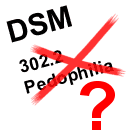|
被禁止的性行為與性暴力
|
|
成人與兒童的性接觸:
孌童癖:強制性的治療
|
|

儘管有一些孌童癖者出於自願去進行精神病治療,但是他們大多數都是因為法庭的命令而不得不去進行這樣的治療。他們通常要經歷某種形式的精神療法,不過在特定的病例,治療中可能要合併使用一些降低性欲的藥物。大體上說,療效不定。在大多數病例,孌童癖者對兒童的性興趣仍舊積重難返,但是,如果他學會控制自己的性衝動,而且不觸犯法律的底線,這也被認為是一個能夠讓人接受的結果。
最近幾年來,人們正在爭論把孌童癖列入作為精神障礙名錄中的性副態(paraphilia)的有用性議題。美國精神病診斷手冊第四版(修訂版)(DSM-IV-TR)因把孌童癖列入與下述障礙有關而受到質疑,即“具有臨床診斷意義的痛苦或在社會交往、職業能力或其他個人能力發揮方面的損害”。對於批評者來說,這就意味著對他自己與兒童的性接觸並不感到痛苦的成人,即感到有幸福感的成人,並不是孌童癖者。(當然,該手冊的起草者絕無有意隱含這種暗示的意圖。)另一方面,一些專家認為這個診斷手冊的精神障礙名錄怎麼說也是被人誤導了,因為它為孌童癖者找到便利的藉口打開了方便之門——如果他們有精神疾病,那麼,他們毋需為自己的行為負法律責任(參見此處)。另有一些人因不同的理由而反對這個疾病名錄:單以這種行為是不道德行為和/或犯罪行為事實本身,就不必要把它弄成什麼疾病的綜合征。那麼,如果這種行為是被社會所接納的,正如曾經在不同的文化裏和歷史各個時期所呈現的一樣,這又該作何種解釋?對那些對兒童有某種性幻想的非孌童癖者又該如何解釋或處理?如果他們也把這些性幻想付諸行動又該怎樣對待?那麼,最後還要問一問,對那些戒除與兒童有任何性接觸的孌童癖者該如何待之?依據什麼標準能夠或應該把他們稱為精神病患者?難道為了精神病學的利益要把該學科本身打造成“思想衛道士”嗎?精神病學只是去對付公然的性行動不是更好嗎?我們不應該把道德的事物讓渡于道德家,也不應該把犯罪行為委託給立法機構、警察和法庭去處理嗎?[1]
|
|
Prohibited Sexual Behavior and Sexual Violence
|
|
Adult Sexual Contact with Children: Pedophilia 3
|
|
 Most pedophiles who appear for psychiatric treatment do so because of a court order, although some also volunteer. They usually undergo some form of psychotherapy, but in certain cases this may be combined with some medication that dampens their sexual urges. On the whole, the therapeutic success is uncertain. In most cases, the pedophile’s sexual interest in children remains, but if he learns to control his impulses and to stay clear of the law, one considers it an acceptable outcome. Most pedophiles who appear for psychiatric treatment do so because of a court order, although some also volunteer. They usually undergo some form of psychotherapy, but in certain cases this may be combined with some medication that dampens their sexual urges. On the whole, the therapeutic success is uncertain. In most cases, the pedophile’s sexual interest in children remains, but if he learns to control his impulses and to stay clear of the law, one considers it an acceptable outcome.
In recent years, a debate has arisen about the usefulness of listing pedophilia among the paraphilias as a mental disorder. The American diagnostic handbook (DSM-IV-TR) has been criticized for specifying that pedophilia is associated with
“clinically significant distress or impairment in social, occupational, or other important areas of functioning”. For the critics, this implies that a happily functioning adult who is not distressed by his sexual contact with children is not a pedophile. (The authors of the handbook, however, never intended this implication.) On the other hand, some specialists believe that the DSM listing is misguided in any case, because it provides pedophiles with a convenient excuse – if they are mentally ill, they are not responsible for their behavior (see
here). Others object to the listing for a different reason: The fact alone that a behavior is immoral and/or criminal does not necessarily make it a symptom of illness. And what if the behavior is socially accepted as it was in various cultures and various times? Were all the adults involved mentally ill? What about non-pedophiles who have some erotic fantasies about children? What if they also act on these fantasies? And finally: What about the pedophile who refrains from any sexual contact with children? By what criterion can or should he be called mentally disordered? Is it in the interest of psychiatry to establish itself as a “thought police”? Isn’t it better to deal only with overt sexual acts? Shouldn’t one leave morality to the moral authorities and crime to the legislatures, the police, and the courts? (1)
(1) Richard Green, MD, JD,
“Is Pedophilia a Mental Disorder?”, Archives of Sexual Behavior, vol. 31, Nr. 6
|